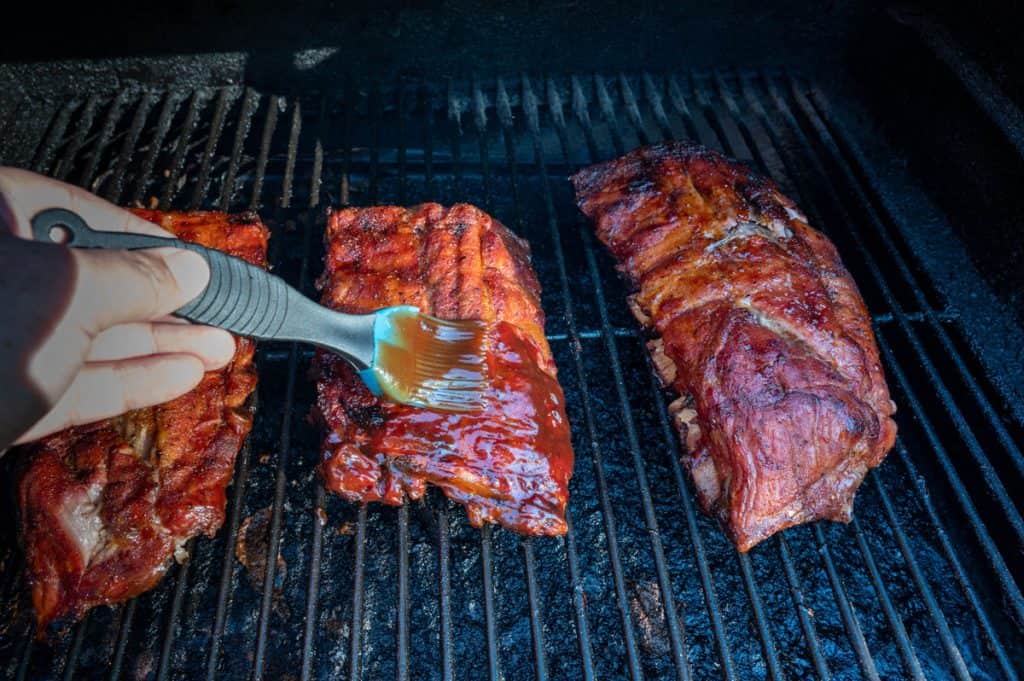Should You Marinate Ribs or Not?
Baby back ribs would benefit the least from a marinade of all the rib varieties we’ve listed here. Generally speaking, the meat is lean and tender, especially when prepared using the 2-2-1 or 3-2-1 method.
Spare ribs, their St. Louis-style counterparts, and country-style ribs are another story. The meat will become more tender by being marinated, giving it the desired melt-in-your-mouth texture. However, you should exercise caution to prevent the ingredients from overpowering the strong pork flavor.
In the end, it’s your call to make. Use a marinade if you want to try out flavors that you can’t get from dry rubs and sauces. Just be careful not to use too much acid or your ribs will become mushy.
Plan to marinate the ribs for 2 to 8 hours for the best results. If it works better for you to marinate them overnight, you can do that as well. Try to avoid letting them sit in the marinade for more than 24 hours whenever possible.
On the other hand, you won’t be missing much if you don’t take the time to marinate. If you choose to use a sauce, you’ll be moistening the ribs in addition to adding flavor with a good dry rub.
In the last few decades, brining, or the practice of soaking meat in a saltwater solution before cooking, has grown in popularity. The meat is kept moist by the salt, making the finished product nice and juicy.
Ribs can be brined rather than marinated, but we wouldn’t suggest doing both. Adding a marinade on top could make the ribs taste overly salty, even though the brine solution shouldn’t be overpowering on its own.
If you choose to brine the ribs, use a mixture of approximately 1 gallon of liquid to every cup of salt. Depending on what you’re serving with the ribs or whether you’re using a sauce, feel free to try different seasoning combinations. Brown sugar, garlic, onion powder, cumin, peppercorns, apple cider, and beer are a few common ingredients.
Ribs should be brined for at least 4 hours and possibly up to 24 hours. Although some chefs advise brining the racks for up to 48 hours, we believe 24 hours is sufficient.
Again, it’s not necessary to brine or marinate ribs. Simply rub a rack of ribs with your preferred type of barbecue sauce after slow cooking them and seasoning them with kosher salt and freshly ground black pepper. Results from this method are frequently just as satisfying as those from more complicated techniques.

Don’t make the mistake of confusing barbecue sauce with marinade. Although both condiments can enhance a barbecue, they should not be used interchangeably.
Most barbecue sauces, especially those that are prepared commercially, have a lot of sugar in them. If the sauce is exposed to direct heat for an extended period of time, it will burn.
Apply the sauce no later than 30 minutes before removing the meat from the grill to prevent this. The ribs should not be cooked until they are just a few degrees below your desired internal temperature. In this manner, you can be certain that the meat will be cooked before the sauce burns.
One last piece of advice: Don’t use too much sauce. The last thing you want is for the flavors that you’ve worked so hard to perfect to become overpowering. If you feel it is necessary, you can always serve more sauce on the side.
yields 4-5 pounds, or enough for two racks of baby backs.
Yields enough for about 3 pounds of country-style ribs
Yields enough for about 3-4 pounds of ribs (any type)
Soaking the Ribs in Marinade
- Try preparing the ribs in a slow cooker to make this even simpler.
- To have extra sauce for the cooked ribs, save some of the marinade before applying it to the meat.
- Add more red pepper flakes to the marinade if you prefer it to be hotter.
- Additionally, while the meat is cooking, you can baste it with additional marinade.
Advertisement
Community Q&ASearch
Ask a Question 200 characters left Include your email address to get a message when this question is answered.
